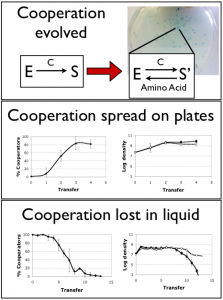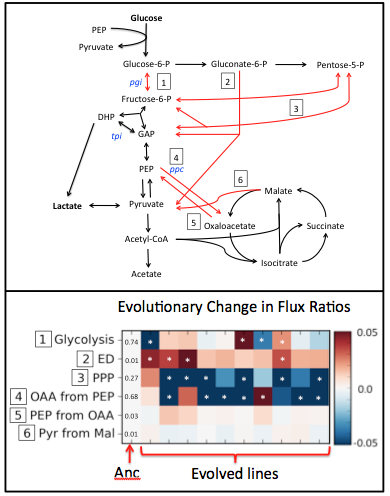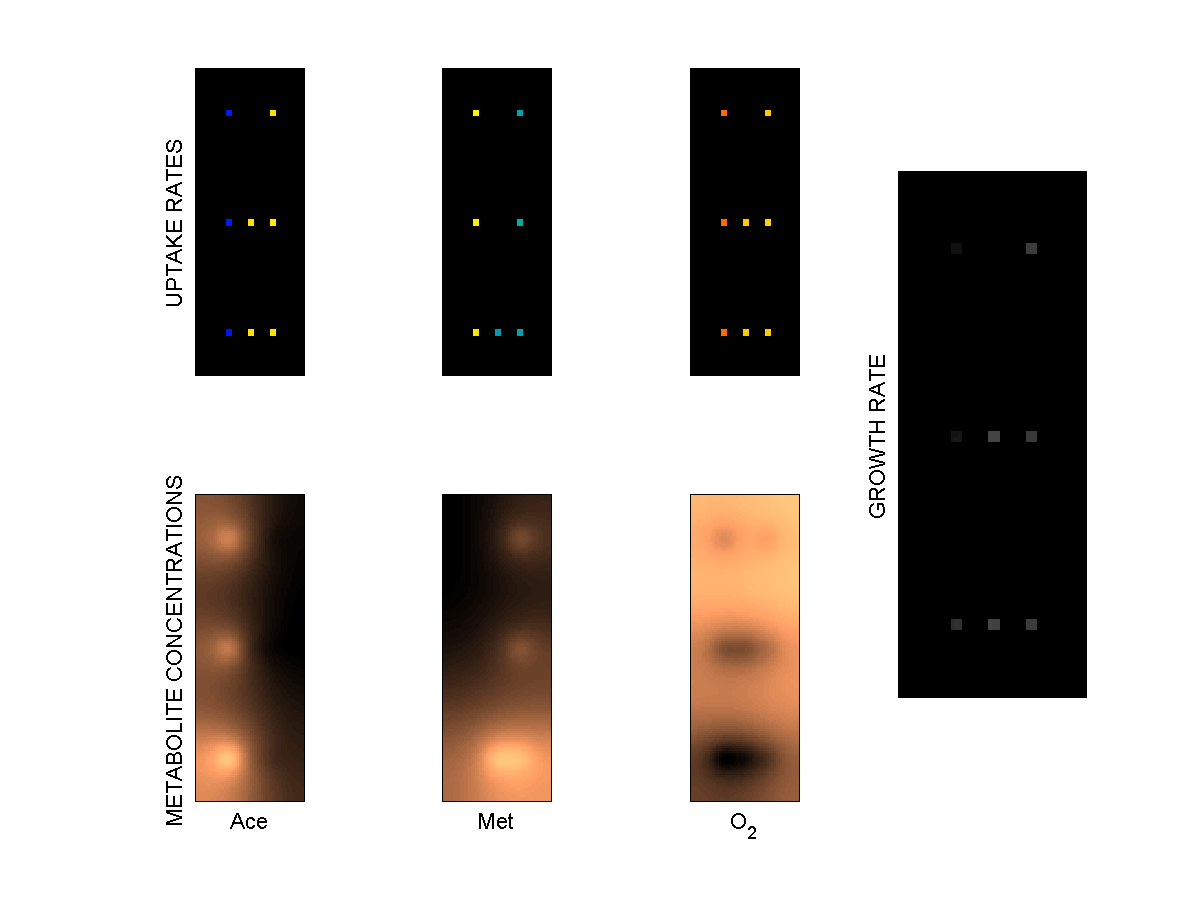Experimental Evolutionary Ecology
Sequencing technology is providing unprecedented insight into the content of microbial communities. Making sense of the bewildering complexity that is being uncovered will require an understanding of the biological processes that govern the composition, function and dynamics of microbial systems.
We confront these challenges by studying community dynamics in the laboratory, where we can control the number and identity of players as well as the environmental context. Additionally, we can investigate the repeatability of observed dynamics through replication and reanimation of communities that have been frozen.
A focus is communities with defined metabolic interactions. Not only are these communities interesting but they are also highly relevant for industrial processes. In previous work we demonstrated that obtaining metabolites from the excretions of another, or cross-feeding, can provide the foundation for the evolution of costly inter-species cooperation. We are now investigating the on-going evolution of this novel mutualism, as well as exploring how the patterns of evolutionary ecology change as the number of interacting species increases.
these communities interesting but they are also highly relevant for industrial processes. In previous work we demonstrated that obtaining metabolites from the excretions of another, or cross-feeding, can provide the foundation for the evolution of costly inter-species cooperation. We are now investigating the on-going evolution of this novel mutualism, as well as exploring how the patterns of evolutionary ecology change as the number of interacting species increases.
Some of the questions that we are pursuing are: How will the rate and parallelism of adaptation change over the course of community evolution? To what extent is the sequence of adaptive steps taken by a species determined by the genotype of its partner? Will mutualists co-evolve such that community properties change as isolates are swapped between different replicate communities? Under what circumstances does evolution increase community robustness to invasion and alter community assembly?
Computational Systems Biology
In addition to the species present in microbial communities, metagenomic sequencing is also providing insight into the genes they encode. To take full advantage of this data it will be necessary to develop computational methods for predicting cellular physiology from genome sequence. Furthermore, we must determine how the social interactions between bacteria convert genetic content into ecosystem function. Finally, we would like to quantitatively predict how evolution influences the dynamics of these complex networks through time.
Flux balance analysis (FBA) is the most powerful, and widely used, method for predicting phenotype based on a cell’s metabolic network. FBA uses stoichiometrically-balanced models to define feasible patterns of metabolite flow  through a cell and then chooses between these patterns by proposing that evolution has selected a metabolic flux that optimizes fitness. My lab tests evolutionary predictions of FBA to improve this critical tool of systems biology and to provide insight into how the connection between genotype, physiology, and phenotype shapes evolutionary processes. We use 13C-labelling techniques to test the physiological impact of each mutation that arises in an adaptive trajectory. What is the step size of physiological adaptation? Can key flux ratios be optimized independently or do genetic changes act pleiotropically to cause network-wide alterations? Are the effects of adaptive mutations independent or are there significant epistatic interactions between them?
through a cell and then chooses between these patterns by proposing that evolution has selected a metabolic flux that optimizes fitness. My lab tests evolutionary predictions of FBA to improve this critical tool of systems biology and to provide insight into how the connection between genotype, physiology, and phenotype shapes evolutionary processes. We use 13C-labelling techniques to test the physiological impact of each mutation that arises in an adaptive trajectory. What is the step size of physiological adaptation? Can key flux ratios be optimized independently or do genetic changes act pleiotropically to cause network-wide alterations? Are the effects of adaptive mutations independent or are there significant epistatic interactions between them?
Species interactions and the effect of spatial organization are not generally captured with constraint-based approaches. I have helped develop an open-source platform for the Computation of Microbial Ecosystems in Time and Space (COMETS). We are using this theoretical framework to bridge the gap between metabolic strategies of individual species and ecosystem-level dynamics. To date the approach has successfully predicted species ratio dynamics in 2 and 3-species consortia, as well as counter-intuitive interactions that arise from the spatial arrangement of colonies. In on going work we are extending this novel approach to investigate the selective pressures that arise from defined metabolic interactions, and the evolutionary ecology of complex microbial communities.

